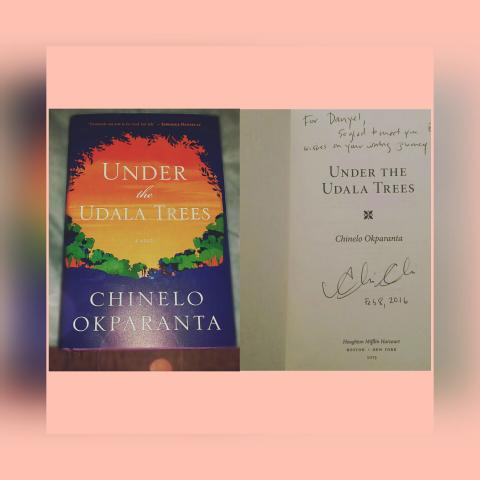Under the Udala Trees (Live Reading Review)
Mar 11,2016
"Under the Udala Trees" by Chinelo Okparanta is created from the point of view of a young girl named Ijeoma who has to endure the war around her, while finding what it truly means to be herself in a world that wouldn't allow otherwise.
While I listened to the author read this beautiful piece, one couldn't help but visualize every detail, down to the scent of the food they ate, to the image of the beautiful butterflies that touched every flower. The author not only read the story to the audience, she embodied each character as they came to her, bringing with her, a different aura as one changed from the next. Small quotes that others would perceive insignificant, I found invigorating. There were many moments in which our protagonist, Ijeoma, would question not only her future but the future of her people as well: "how long into the future would we have to bear the burden of our loss?" And then there were subtle moments, as such when she brought on the personification of war: "war barged in and exposed itself." Her imagery was so pure, yet natural and delicate. Every bit of this could, as well, be perceived through the way the author captured her characters.
I have had some time to read this novel myself, and I've become even more taken by her work. There are no scenes that leave you questioning the outcome of the story, but rather scenes that leave you wondering. Something I believe to be a need in every reader as they come upon a book that captures so much emotion. No chapter left you feeling short of something or at a loss of visualization or explanation. Every chapter somehow captured a strong emotional tie that kept our protagonist wrapped in her thoughts and in her wonders.
I believe a lot of people could take the most from this story, other than finding it a good read. Ijeoma does a lot of things one would expect a little kid to do that is experiencing war, but she also does something that every single one of us endures every time we think. She questions. She questions the present, the future, and most importantly, the past. ‘What ifs' consume her mind, an apparent emotion that we all are accused of having. But instead of leaving her doubtful of what is to come, I see a light in our protagonist that steadies her footsteps as she continues to travel further and further into this war.
Returning to the quote I spoke of earlier, also ties into this. "How long into the future would we have to bear the burden of our loss?" Such a strong quote with much more meaning than a simple description of the novel as a whole. It speaks to everyone. When I listened to the quote, I immediately thought back on American history and how to win, ultimately means for others to lose. No matter what, war will always deal with one side damaging another, consequences put aside. And as Ijeoma looks upon the damage the war has sent her people; destruction, cries, children looking for their loved ones, or loved ones simply lost, the audience is hauled into this world in which, war may have seemed necessary but truly...was it?
This tear that the war brings also pulls yet pushes the struggle of our protagonist's heart, for it is not only the war that she has to worry about as well but how her heart truly lies when it comes to love. Through the hardships of war, Ijeoma comes to a love another girl. And though the war places a physical and mental struggle on them all, these two appear to combat more with the emotions of loving one another and how, in the world that they live in now, same gender relationships are not looked highly upon. In fact, it is considered a sin.
The destruction of war and societal thinking that conquers her culture is the ultimate battle that Ijeoma must face. As another character, Mama, states in the novel, roughly quoted, "not everyone wants to hear the continuous destruction of their country." It is a truth and a burden that this book, brilliantly written by Chinelo Okparanta, brings to light.






